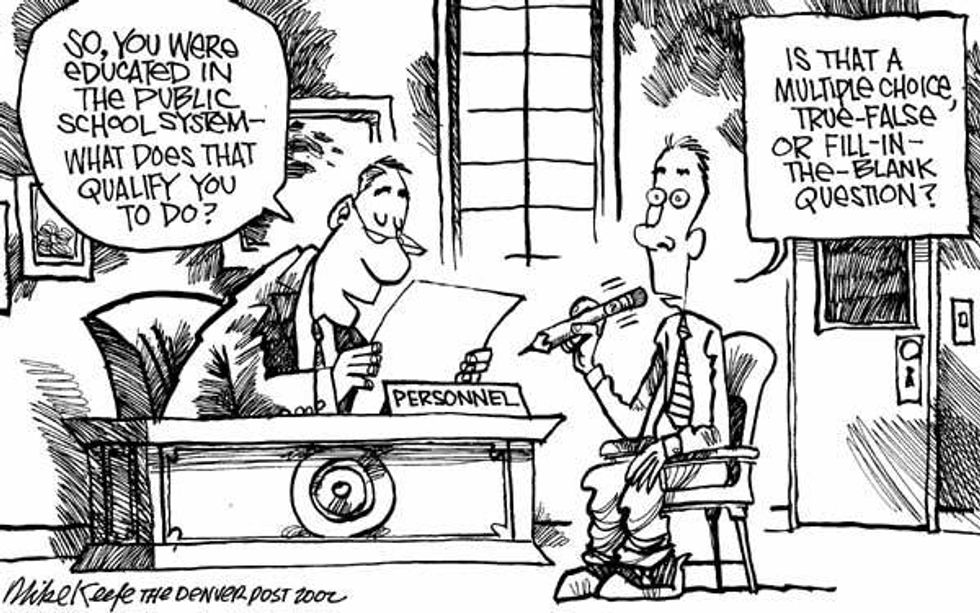I am a college student. I am a man. I am strong. I am smart. All of these things contribute to who I am, yet I can’t help but feel that my 3.50 GPA has begun to define who I am. I put a lot into going to school -- especially money, but also time, emotion and tons of energy. I put all of these things into my education, butit seems like the only thing that measures my output is my GPA. Is that fair? Is that all college is? Is my success in college measured on a 4.0 scale, or is there more to it? I believe that our generation is being put under the notion that if our GPA isn’t good enough, then neither are we. It’s created this paradox where we want to be the best that we can be, but by measuring our accomplishments on a single-faceted scale, we are actually hindering our successes.
This belief that our GPA defines who we are affects our everyday interactions. Spare time is no longer the time to watch Netflix and call your family; instead, that time is spent at the library studying for an exam that’s two weeks away. Doing homework is good. Learning is good. But when it begins to consume our lives, what effect does that stress have on our overall mental health?
Because we are becoming increasingly defined by our GPA, a test is no longer just a test. In the process of obtaining a four-year bachelor’s degree, we take hundreds of tests and quizzes, but each one feels like our entire future is riding on it. In the grand scheme of things, does one test really matter? Does getting a B in a class instead of an A change who you are? In the process of preparing ourselves for these exams, we normalize the notion of sacrificing all other things in order to focus on the test. How many times have you found yourself at 2 a.m. drinking a Starbucks espresso cramming for an exam the next day? For the sake of one single test, we sacrifice sleep, health, and sanity.
The pressure on students makes it feel like failing one test makes you a failure, period. Last week I took an Arabic exam and it was the kind that made you want to rip your hair out because you studied so hard and still knew nothing. For the rest of the day I had knots in my stomach thinking about what I did wrong; thinking about what a failure I was. That exam is 10 percent of my grade in that class. Why does that one goddamn test get to tell me if I’m good at something or not? You cannot measure the capacity of a dynamic individual on a dynamic topic on a stagnant piece of paper and expect the result to be black and white. That exam grade doesn’t take into account the fact that you can speak better than you write. It doesn’t take into account the fact that your teacher is an idiot. The only thing that exam takes into account is what you wrote on that piece of paper. But you are much more than that piece of paper, right?
This pressure on students to achieve a high GPA also discourages us from taking a harder class or pursuing a harder major. I believe that we are a driven generation. We want to succeed and compete and be better, but how we view the grading system discourages us from taking these harder classes. The pressure of GPA is not only discouraging us from broadening our learning spheres, but it’s also discouraging us from discovering any new potential. The system isn’t just hurting individual students; it’s hurting the future of society. We are learning how to pass a class, rather than actually learning how to initiate progress.
With the pressure of college, comes guilt. We all have made drunken mistakes to feel guilty over, but this GPA paradox adds a new realm of guilt to the game. We, as individuals, begin to feel guilty for taking mental health time, when that should be the norm. But this pressure leads us to sacrifice gym time, tanning time, and drunken nights at rockin’ sushi (please tell me someone gets the Bridesmaids reference) and whatever else makes us feel good. And in a lot of cases, this leads to mental issues. According to psychocentral.com, 44 percent of college students in America struggle with feelings of depression. Suicide is the second leading cause of death among people our age. Maybe this pressure to perform to the standards of an arbitrary and impersonal grading scale is causing these problems to occur in young adults. It just may be time to start reevaluating what really matters.
Some of this is rooted in huge concern about the future. We've generated this belief that every test, homework assignment, or essay has a direct impact on our future.
We hold all of these career workshops and career fairs and grown-up world related events that emphasize the future so much more than the now. That train of thought soils the point of being 21. This is the time where we are supposed to live and make mistakes, but if our every move is as calculated as our GPA, then how can we ever truly learn?
I am writing to tell you that your GPA does not define you. You, as a human being, are multi-faceted. You have levels. You have the ability to change and grow. They say that you emulate who you spend your time with. If you spend all your time with that stupid math text book that probably cost you $200, then you lose a large part of what actually defines you. I believe that we find ourselves through our relationships with others, and obsessive concern with a GPA can hinder your ability to foster these relationships. While, yes, your college years are a time to learn calculus, more importantly, they are a time to learn who you are through interactions and experiences. I don’t know how much experience your math textbook can give you, but I can guarantee it’s not as much as exploring life around you.
I want you to know that if you get a 3.0, and the person next door gets a 3.8, they are not better than you. Their future isn’t necessarily going to be better than yours. All that means is that maybe you didn’t fully understand that essay prompt. Maybe your lower GPA means that you took a hard class and pushed yourself out of your comfort zone. Maybe it means you had a rough personal issue that you worked through this year. You are not a 3.0. You are not less. You are you.
The bottom line is that you choose how you define yourself. Everyone has strong points and everyone has weak points. You can let your academics be one of your strong points, but it does not define who you are. You are strong. You are spunky. You are driven. You are not a number on a four-point scale. You define who you are.


















